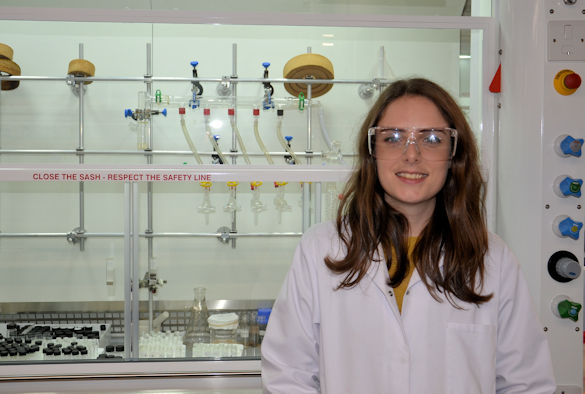Chloe Pugh has just finished writing up her thesis for her PhD in materials chemistry.
She shares her experience of studying in the University’s Materials Innovation Factory, an £81 million facility dedicated to the research and development of advanced materials, which will be officially opened later this week:
Liverpool is one of the best universities for studying materials science especially with the Materials Innovation Factory (MIF) which supports people from all disciplines, including life sciences, mathematics and physics, working together on similar projects to advance materials science in a new way.
Pushing boundaries
Rather than the traditional method of ‘trial and error’ synthesis followed by analysis, at the MIF we are pushing boundaries allowing us to combine computational chemistry, robotics and synthetic work to increase the work flow and speed up materials discovery.
My research involved the use of X-ray radiation to determine the atomic structure of a material, this is known as crystallography. This provides us with what is known as the structure-property relationship. This information is important as it allows us further understanding as to why a material exhibits certain properties.
Porous Organic Cages
The materials I worked with are known as Porous Organic Cages, molecular cages which have capabilities of selective gas uptake, and can be used to reduce greenhouse gases in the atmosphere, as well as the removal of carcinogenic molecules such as formaldehyde.
As my PhD was primarily focused on crystallography, I have had had the chance to visit the Diamond Light Source in Oxford, which uses incredibly high powered X-rays. I also visited the Advanced Light Source in Berkeley University in California.
Skill sets
My PhD has provided me with skill sets which extend far beyond using equipment or chemical reactions. I have learned how to interpret data effectively, which can be applied to a high number of jobs an how to present data in a way which either the general public could understand or a scientist from a different field.
The opportunity to work in the MIF during my PhD has been fantastic, the facilities are truly state of the art, but more importantly the equipment available for use is truly incredible.
During my research career, I have been lucky enough to receive training from experts allowing me to continually develop as a scientist. As well as improving on my subject-specific skills, I have also attended and presented at conferences abroad, and been involved in workshops developing me as both a chemist and a future employee.
Future career
As much as I have enjoyed my four years in research, I have decided to take my future career into industry, ideally in a research and development role. Furthermore, I am excited for the new challenges and opportunities in my career.
Without the excellent staff, incredible training and opportunities during my time working at the MIF, I wouldn’t be the well-rounded chemist I am today.
The Materials Innovation Factory will be officially opened by the President of the Royal Society and Nobel Laureate, Sir Venki Ramakrishnan, on Friday, 5 October 2018.
